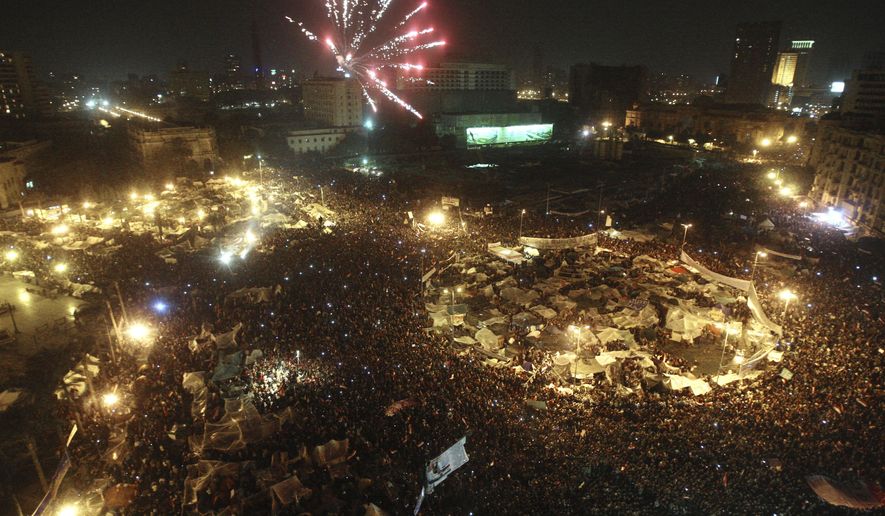CAIRO — When the news of President Hosni Mubarak’s resignation broke early Friday evening, ecstatic protesters across Cairo rushed into Tahrir Square — whistling, cheering and shouting “God is Great!” and “He’s gone!”
Many wept with joy.
After 18 days of protests that left about 300 people dead, thousands injured and the Egyptian economy crippled, Mr. Mubarak finally had given in. After nearly 30 years in office, he will resign and leave the Egyptian army in charge until the country can elect new leaders.
Vice President Omar Suleiman delivered the announcement on state television, even as thousands of protesters stood outside the station shouting, “The liars are in that building.”
The news spread across Cairo in a flash as shouts and whistles rang out across the city.
“In these grave circumstances that the country is passing through, President Hosni Mubarak has decided to leave his position as president of the republic,” Mr. Suleiman said. “He has mandated the Armed Forces Supreme Council to run the state. God is our protector and succor.”
It was not clear what role Mr. Suleiman would play in the military’s takeover of the government.
President Obama hailed the demonstrators’ victory, calling it the “beginning” of Egypt’s transition. “The people of Egypt have spoken,” he said. “Their voices have been heard. And Egypt will never be the same.”
In Tahrir Square, protesters-turned-revelers said they trusted that the army would facilitate a peaceful transition to democracy.
Shortly after the announcement, the Egyptian army said the military was not a “legitimate” government and later would announce plans to implement the changes demanded by the Egyptian people.
Chief among the demands for change — after the ousting of Mr. Mubarak — are free and fair elections. Analysts say that real democracy might threaten the alliance between Egypt and Israel, as the Jewish state has almost no popular support in Egypt.
But for the time being, Egypt is under the leadership of Defense Minister Mohamed Hussein Tantawi, a 75-year-old veteran of the 1956 Suez Crisis and in both the 1967 and 1973 Arab-Israeli wars.
A U.S. State Department cable made public by the anti-secrecy website Wikileaks said he is “committed to preventing another” war with Israel, according to Reuters.
The army is popular among Egyptians and has maintained a good relationship with protesters throughout the days of upheaval. During the protests, officers vowed publicly not to shoot at the crowds, and soldiers posed for pictures with children on tanks, covered with graffiti that says, “Get out Mubarak.”
But many Egyptians are cautious about the prospect of military rule, noting that one of the main sources of their discontent has been human rights abuses at the hands of the Mubarak security forces.
The army, while not part of the accused forces, has been led by Mr. Mubarak for 30 years.
Other Egyptians say that after the revolution, no government would dare impose oppression upon their nation.
“Now we know how to revolt against any dictatorship,” said English teacher Mohamed Aboulfotouh. “And we are the ones that can tell whether this is a dictatorship or democratic. Because we have been living 30 years in a dictatorship.”
On Friday night, the square already was packed with protesters when the announcement of Mr. Mubarak’s resignation drew thousands from every corner of the city to what is now considered and Egyptian icon of freedom.
Attempts to control the crowd were soon abandoned. With barely any room to move, revelers squished pass rows of soldiers in riot gear, who watched casually. Other soldiers stood on tanks, while the crowds below waved flags and shouted, “The army and the people are one.”
Revelers across the country said their victory was not just for Egypt, but for the whole world. Inspired by the uprising in Tunis last month, Egyptians say they have proven that it is possible to take on powerful government and win.
“Mubarak lost. We won,” said Alexandrian lawyer Ashraf El-Deib, as firecrackers erupted in Cairo. “If any government is bad, they have to change it. They have to learn from us, and learn from Tunis, too.”
As cars honked late into the night across Cairo and revelers continued to hoot in joy, massive posters of the people killed in the uprising hung over the square, reminding the crowd of the gravity of the event.
“Those who died for their country,” one group sang as they danced in Tahir Square, “will be waiting for us in heaven.”
This article is based in part on wire service reports.




Please read our comment policy before commenting.